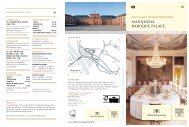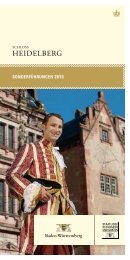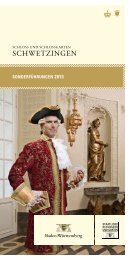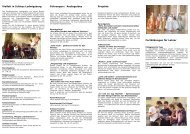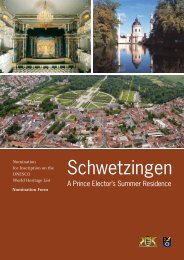Schwetzingen - Schlösser-Magazin
Schwetzingen - Schlösser-Magazin
Schwetzingen - Schlösser-Magazin
You also want an ePaper? Increase the reach of your titles
YUMPU automatically turns print PDFs into web optimized ePapers that Google loves.
VII.<br />
214<br />
VII. Appendices<br />
new and prestigious palaces in more spacious<br />
surroundings, was not uncommon in the<br />
early 18th century. Several examples could be<br />
found in the vicinity – Rastatt, Karlsruhe and<br />
Ludwigsburg.<br />
During the reign of Carl Philipp,<br />
<strong>Schwetzingen</strong> was occasionally used as an<br />
alternative residence while the Mannheim<br />
palace was being built; afterwards it served<br />
as a hunting lodge and summer residence.<br />
The stuccoed, Régence-style ceilings date<br />
from Carl Philipp’s time. 12 In the garden, in<br />
the vicinity of today’s Arion fountain, the<br />
Elector had an orangery built. This housed the<br />
plants from the Düsseldorf orangery that had<br />
been brought to <strong>Schwetzingen</strong> in 1724, being<br />
shipped up the Rhine to Ketsch. There were<br />
447 orange trees and 313 other plants in tubs.<br />
The orangery also contained a large hall for<br />
festivities, and was connected with the main<br />
palace by a passage. However, it soon became<br />
dilapidated, and was pulled down in 1755. 13<br />
Carl Philipp died on 31st December 1742.<br />
He had been married three times but left no<br />
male heir. His only daughter had died in 1728,<br />
leaving three granddaughters, the eldest of<br />
whom, Elisabeth Augusta, had been married<br />
to the nearest male relative and heir of the<br />
Palatinate – Carl Theodor, Count Palatine.<br />
(Susan Richter)<br />
Carl Theodor (1724-1799),<br />
Elector Palatine (1742-1799),<br />
Elector of Bavaria (1777-1799)<br />
Carl Theodor was born on 10th December<br />
1724 at Drogenbusch near Brussels; his title<br />
was then Count Palatine of Sulzbach. 14 In<br />
1733, he was engaged to be married to his<br />
cousin, Elisabeth Augusta, and after the death<br />
of his father, Duke Johann Christian von Pfalz-<br />
Sulzbach, he became heir of the Palatinate<br />
12 Carl Ludwig Fuchs, Schloß <strong>Schwetzingen</strong>, <strong>Schwetzingen</strong> 1991,<br />
p. 9.<br />
13 Hubert Wolfgang Wertz, “Die Schwetzinger Orangerien”, in:<br />
Der Süden im Norden, Regensburg 1999, pp. 59 ff.<br />
14 Susan Richter/Ralf Wagner: “Geburt und Taufe Karl Theodors.<br />
Eine Betrachtung zum 275. Geburtstag des Kurfürsten 1999”,<br />
in: Mannheimer Geschichtsblätter, new series, Vol. 6. Ed. Gesellschaft<br />
der Freunde Mannheims und der ehemaligen Kurpfalz<br />
Mannheimer Altertumsverein von 1859, Ubstadt-Weiher 2000,<br />
pp. 297-304. The baptismal register confirms the date of birth,<br />
10th December 1724.<br />
in the same year. The ruling Elector Carl<br />
Philipp (b. 1661, r. 1716-1742) brought him to<br />
Mannheim in 1734 to be educated. In 1742,<br />
the marriage of Carl Theodor and Elisabeth<br />
Augusta was celebrated at Mannheim with<br />
much splendour. On New Year’s Eve of that<br />
year Carl Philipp died, and Carl Theodor<br />
succeeded him as Elector Palatine.<br />
The guiding principle of Carl Theodor’s<br />
foreign politics was the maintenance of peace<br />
and the avoidance of military conflict. The<br />
Elector realized that small countries were<br />
better off remaining neutral than trying to<br />
meddle in the affairs of larger powers. During<br />
his 56-year reign, the transition from the<br />
age of Absolutism to that of Enlightenment<br />
is unmistakeable. Legal texts now cited the<br />
principles of reason and stressed human<br />
happiness and the benefits for the state<br />
arising from it. Thus Carl Theodor wrote to<br />
his sister-in-law, Franziska Dorothea, that<br />
“the happiness of the most insignificant<br />
among my subjects” was dear to him. 15 These<br />
sentiments, so characteristic of their time, in<br />
1776, culminated in the abolition of torture in<br />
the Palatinate.<br />
Carl Theodor’s fostering of the sciences<br />
reached European status. Among the<br />
accomplishments of his academy, the<br />
Pfälzische Akademie der Wissenschaften<br />
founded at Mannheim in 1763, were the<br />
introduction of lightning conductors 16 ,<br />
the discovery of new stars and the first<br />
scientifically based weather observation in<br />
history 17 . The Elector’s interest in Classical<br />
antiquity, so evident from the layout of the<br />
<strong>Schwetzingen</strong> garden and its buildings,<br />
resulted in a trip to Italy in 1774/1775;<br />
another was to follow in 1783. Carl Theodor’s<br />
schedule – he visited Rome, Florence, Livorno,<br />
Pisa and Venice – bears witness to the<br />
15 Geheimes Hausarchiv München Correspondenz Akten 1313.<br />
The letter is without a year.<br />
16 In1776, Carl Theoodor became the first German ruler to have<br />
his palaces outfitted with lightning conductors; they are still<br />
visible on the roofs of <strong>Schwetzingen</strong> Palace.<br />
17 Carl Theodor owned some meteorological instruments himself;<br />
in his Mannheim and <strong>Schwetzingen</strong> cabinets he regularly<br />
took readings and noted down the results. These scientific<br />
statistics were conducted in all the 39 Palatine weather stations<br />
worldwide.




